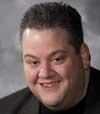
Director, Respiratory Services
and Sleep Medicine
Orange Regional Medical Center
Middletown, NY
AARC Member since 1986
AARC Activities
Member, Board of Directors, 2010—present
Chair, Government Affairs Committee, 2005—present
Chair, Membership Committee, 2012
Chair, Audit Subcommittee, 2007
Member, Finance Committee, 2006—2007
Member, Audit Subcommittee, 2006
Member, Political Action Committee (PAC), 2006—Present
Member, By-laws Committee, 2005—2006
Member, Membership Committee, 2004
Member, Smoking and Tobacco Related Issues Committee, 2003
HOD Activities
Past HOD Speaker, 2009
HOD Speaker, 2008
HOD Speaker Elect, 2007
HOD Treasurer, 2006
Senior Delegate, Connecticut Society for Respiratory Care, 2005—2006
Junior Delegate, CTSRC, 2004—2005
Committee Membership
Member, Delegate Assistance Committee, 2006
Member, Ad Hoc Committee for Home Care Recognition, 2005—2006
Member, Chartered Affiliates Committee, 2005—2006
Affiliate Activities
Past President, CTSRC, 2002—2004
President, CTSRC, 2000—2002
President-Elect, CTSRC, 1999
Treasurer, CTSRC, 1997—1998
Board of Directors, CTSRC, 1995—1997
Chair, By-law Committee, 1996—2000; 2002—2003; 2004
Chair, Budget and Audit Committee, 1997—1998
Member, Membership Committee, 2002—2008
Member, Program Committee, 1997—2008
Member, Bylaws Committee, 1996—2006
Member, Budget and Audit Committee, 1999—2004
Organization Service
Certified Basic Life Support Instructor, American Heart Association
Certified Pediatric Advanced Life Support Instructor, American Heart Association
Member, Society for Critical Care Medicine, 2003—present
Member, American College of Healthcare Executives, 2011—present
Education
Bachelor of Science, University of Hartford, West Hartford, CT, 1988
Master’s of Business Administration, University of Phoenix, Norwalk, CT, 2009
Credentials
Registered Respiratory Therapist, National Board for Respiratory Care, 1989
Certified Respiratory Therapist, National Board for Respiratory Care, 1988
What AARC or Chartered Affiliate offices/positions have you held where you feel you made a significant contribution to our profession? What is the contribution and how will you apply it to your new position if elected?
I feel my role of Chair of the AARC Federal Government Affairs Committee has offered me the ability to contribute most to our profession. Simply put, that contribution is advocating for our patients and profession. I have met many people throughout our country who feel as strongly as I do in this regard. Our work each year in getting recognition for respiratory therapy may be met with resistance, but I can tell each year that more of the Washington insiders know about Respiratory Therapy and what we do and advocate for. They see us as patient advocates and in it for the long haul. My perseverance and drive to advocate for our patients and profession is exactly what members need of the Executive Committee of the AARC. I will work tirelessly in my role to ensure that the values and advancement of respiratory therapy continues.
As a leader, what do you see as the top 3 priorities for the AARC, and what steps would you take to advance those priorities?
1. A smooth transition of leadership within the AARC as our volunteer leadership works to decide who the new Executive Director is and guides them in their vision of where our profession will be going in the next 5-10 years.
2. The advancement of our profession to ensure that we continue to be an active player in the health and well being of our patients in any venue of care. That includes advocacy of legislation that ensures respiratory therapists are recognized at all levels of government as a provider of care for patients.
3. Membership in the AARC needs to continue its positive growth that has been seen in the past year. There is strength in numbers and we need RTs around the country to know that membership equals advancement of our profession. I will continue to work tirelessly on the executive board, government affairs and the membership committees to advocate for all of the above.
Leadership development is an issue facing many organizations, including the AARC. What can the AARC do to mentor the next generation of leaders?
Encourage members to get involved and once they get involved, appoint a mentor to be there to answer their questions and encourage them. We have many current leaders that are very good role models and I would use them to develop the new leaders. We also need to work with the committee working on the Leadership Institute. This venue could be another formal way to light that fire from within the member who wants to get involved but may be a little self conscious about how to get started. There are many in our profession that may see getting involved on the state or national level as part of an elitist group. We need to demystify this by opening these meetings to the rank and file membership. We need to have the meetings at convenient times for the general membership and state societies should think about moving their meetings around the state to get more participation from the members.